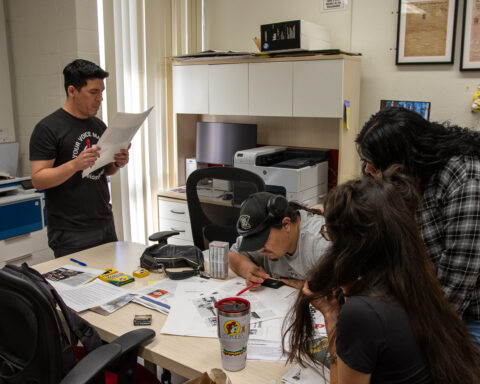
California lawmakers are seeking proper regulation for marijuana and cannabis-related products, after Proposition 64’s passage permits indoor plant cultivation and recreational marijuana use for all eligible individuals.
Consumers cannot possess marijuana in public or be under its influence while driving. People must also be 21 or older to purchase cannabis, unless under a medical doctor’s recommendation.
“The City of Santa Ana is ready, willing and able to [be compliant in order to regulate the industry]. It’s the local law,” said Santa Ana City Communications Manager José Garcia.
California marijuana possession for individuals under 21 requires offenders to submit to drug counseling and community service. Offenders over 18, possessing more than 28.5 grams of flower or more than 8 grams of concentrated cannabis, will face up to six months in county jail or a $500 fine. First-time offenders will face a $250 fine.
Santa Ana is working to regulate all medicinal and recreational retail locations within the city, with every legal location acquiring and maintaining a permit and paying all required funds to stay operational.
In the last three months, Santa Ana has moved towards becoming a full marijuana sector, allowing commercial grows and applications from three applicants.
State law requires dispensary retailers to go through approved online marijuana databases rather than private cultivators to acquire their products. These databases sell different brands in mass, removing the need for private cultivators.
“We used to purchase our product from vendors. Vendors used to be one guy and he’d call us up, we would sit down and he’d do a delivery. It was very unofficial and unorganized — a back door way of doing business,” said Mark Kapur, manager of From The Earth dispensary in Santa Ana.
Local law supports legally permitted dispensaries that abide by the Adult Use of Marijuana Act within local jurisdiction of the city they are residing in. This contrasts with the drug raids and criminal charges of the past.
State lawmakers also continue to experience difficulty classifying a proper drug dosing for both recreational and medical marijuana consumers, recognizing the differences in an individual’s tolerance levels.
“The problem with marijuana under-the-influence charges is that we don’t have a per se limit for marijuana unlike alcohol testing,” said law firm owner and stand-in Orange County judge Lorrie A. Walton, who noted that marijuana affects the brain rather than the nervous system.
“Marijuana is measured in nanograms per milliliter, so if one person has a high nanograms per milliliter count, then someone else who ends up in a testing situation at a trial with these tolerance levels could take a lot longer to try these cases,” Walton said.
California law enforcement officials are also developing marijuana-related DUI protocols. There is a growing interest in forming a test that would show whether the suspect was intoxicated at the time of the offense and the individual’s active and inactive THC levels.
The state is attempting to administer blood tests and saliva testing; however, both tests do not determine how intoxicated the person is at the time of incident, since cannabis remains in the body for about 30 days after initial consumption. Law enforcement must acquire a McNeely warrant at the time of the offense, requiring the driver to submit to a blood draw to determine if the person is under the influence as a result of cannabis.
“The Orange County crime lab has seen a definite increase in the prevalence of drug-impaired driving cases submitted for testing since the passage of Prop. 64,” said Orange County District Attorney’s Office spokeswoman Michelle Van Der Linden, who noted that the trend is similar to the cases in other states that have decriminalized marijuana.
“Our office has been instrumental in creating outreach and education programs designed to educate drivers of the impacts of drug-impaired driving,” Van Der Linden said.
- Landscape and Garden Tour of the New Central Mall - June 1, 2019
- Subculture Party Brings Rave Culture to DTSA - May 9, 2019
- California Needs to Lower Its Outrageous Gas Prices - May 3, 2019












